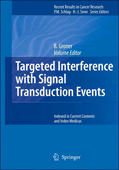Two aspects of biological research are major contributors to the
progress in the understanding of cancer etiology and the development
of new and improved cancer drugs. The sequencing of the human genome
provides us with a basic overview of all our genes and gene products,
and the insights into signaling pathways allow us to align crucial
components of cellular regulation into an ordered functional context.
A comparison of the genes in normal and in tumor cells shows that
mutations in the DNA of a limited set of genes are responsible for
the multiple stages of tumorigenesis and metastasis. Many of the
affected genes, including oncogenes, tumor suppressor genes and
genome stability genes, can be fitted into pathways. They encode
molecules that stimulate tumor cell division or inhibit their death.
Matching of therapeutic intervention with insights into the
underlying molecular disease mechanism has already led to the
development of drugs such as Herceptin and Glivec. The deregulation
of pathways as a consequence of the altered biochemical function of
mutated cancer genes provides the conceptual basis for future
progress. Will it be possible to extrapolate this principle and
derive more efficient drugs targeting cancer pathway components?
Promising cell surface molecules, potential targets of monoclonal
antibodies, and intracellular molecules with enzymatic activity,
potential targets for low-molecular-weight synthetic inhibitors, have
been identified. Our ability to predict the consequences of
inhibition of such components, however, is still limited. For this
reason, the development of targeted drugs remains a complex process,
comprising rational and empirical elements. The state of development
of tomorrow’s cancer drugs, directed against growth factors, growth
factor receptors and intracellular signaling molecules with kinase
activities, is described in this book.
차 례
Identifying critical signaling molecules for the treatment of cancer.
Tyrosine kinase inhibitors and cancer therapy. Targeting ERBB
receptors in cancer. Inhibition of the IGF-I receptor for treatment
of cancer: kinase inhibitors and monoclonal antibodies as alternative
approaches. Inhibition of the TGF-ß signaling pathway in tumor
cells. The mammalian target of rapamycin kinase (mTOR) and tumor
growth inhibition. The Ras signaling pathway as a target in cancer
therapy. The mitogen activated protein kinase pathway for molecular-
targeted cancer treatment. The function and the inhibition of the c-
SRC gene in tumor cells.


